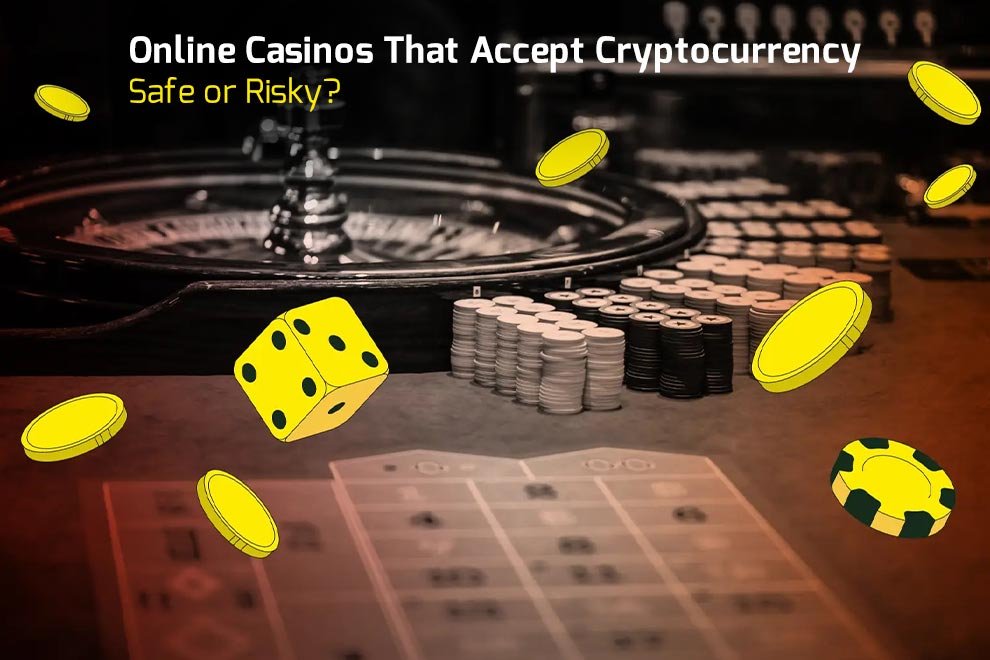Cryptocurrency has taken the world by storm, and the online gambling industry is no exception. Today, more and more online casinos are accepting Bitcoin, Ethereum, and other digital coins as payment options. These crypto casinos promise faster transactions, more privacy, and lower fees.
But with new technology comes new questions. Are online casinos that accept cryptocurrency truly safe? Or are there hidden risks players should know about?
In this blog, we’ll explore the pros, cons, and safety tips to help you decide whether playing at a crypto-friendly casino is the right move for you.
What Are Cryptocurrency Casinos?
A cryptocurrency casino is an online gambling platform that allows players to deposit, wager, and withdraw using digital currencies like Bitcoin, Ethereum, Litecoin, or USDT. Some casinos accept only crypto, while others offer it as one of many payment options alongside traditional methods like credit cards or e-wallets.
Two Types of Crypto Casinos
- Hybrid Casinos: These accept both fiat (regular money) and cryptocurrencies.
- Pure Crypto Casinos: These operate exclusively using crypto for all transactions.
Why Players Choose Crypto Casinos
Many players are attracted to crypto casinos for the unique benefits they offer.
1. Faster Transactions
Cryptocurrency payments are processed almost instantly, especially compared to traditional bank transfers that can take days. Withdrawals are typically quicker, giving players faster access to their winnings.
2. Increased Privacy
You don’t need to provide as much personal information to deposit with crypto. This appeals to players who value anonymity or want to avoid sharing sensitive financial details.
3. Lower Fees
Many crypto transactions come with little to no processing fees. This can be especially helpful for high rollers or players making frequent transactions.
4. Global Access
Cryptocurrencies are borderless. This means you can gamble on the highest paying online casino from countries where traditional banking methods may be restricted or unavailable for gambling.
Are Crypto Casinos Safe?
The short answer is: they can be—but not always. Just like traditional online casinos, safety depends on several factors, including licensing, regulation, and how the platform handles your data and funds.
Signs of a Safe Crypto Casino
- Proper Licensing
Reputable casinos are licensed by authorities like the Malta Gaming Authority or Curaçao eGaming. A license means the site must follow rules around fairness and security. - Secure Website (HTTPS)
The site should use encryption (look for a padlock icon in the browser address bar) to protect your data. - Provably Fair Games
Some crypto casinos offer “provably fair” systems. This means the game outcomes can be verified for fairness using blockchain technology. - Transparent Terms and Conditions
The casino should clearly explain its rules, bonuses, withdrawal limits, and verification process. - Good Reputation
Check player reviews, forums, and trusted casino review sites. If the casino has a history of delaying payouts or other shady behavior, avoid it.
Risks to Watch Out For
While crypto casinos offer many benefits, there are also real risks to be aware of.
1. Lack of Regulation
Not all crypto casinos are licensed. Some operate in a legal gray area, which means you might have no protection if something goes wrong. Unregulated sites could refuse payouts, manipulate games, or vanish overnight.
2. Irreversible Transactions
Once you send crypto, there’s no way to reverse the payment. If you make a mistake or send it to a fraudulent address, it’s gone for good.
3. Volatility
Cryptocurrency prices can change quickly. If you win in Bitcoin and its value drops the next day, your winnings could be worth less when you cash out.
4. Scams and Fake Sites
Some sites pose as legit casinos but are actually scams. They use attractive bonuses to lure players, only to disappear after taking your crypto.
How to Stay Safe at Crypto Casinos
If you want to enjoy the benefits of gambling with cryptocurrency while minimizing risk, follow these tips:
1. Stick to Licensed Casinos
Only play at crypto casinos that are licensed by a recognized gaming authority. This ensures some level of oversight and accountability.
2. Do Your Research
Check the casino’s reputation online. Read user reviews, look for complaints, and see how long the platform has been around.
3. Start Small
Don’t deposit large amounts of crypto right away. Test the casino with a small deposit to make sure it processes payments smoothly and fairly.
4. Use a Secure Wallet
Store your cryptocurrency in a reliable wallet, not on an exchange. When making transactions, double-check the wallet address before sending.
5. Watch Out for Bonuses That Seem Too Good
Be cautious of casinos offering massive welcome bonuses with unclear terms. Always read the fine print to avoid getting locked into impossible wagering requirements.
Crypto and the Future of Online Gambling
Cryptocurrency is reshaping the way players interact with online casinos. As technology improves and more people embrace digital coins, we’re likely to see even more crypto-friendly platforms appear.
In fact, some experts believe blockchain technology will eventually lead to fully decentralized casinos, where games, payouts, and security are all managed transparently without a central authority.
While the technology is promising, it’s still evolving. That’s why it’s important to stay informed and cautious—especially when real money is involved.
Final Thoughts
Online casinos that accept cryptocurrency can be both safe and risky. The key is knowing how to spot the trustworthy ones and understanding the risks that come with digital currency.
If you value fast transactions, privacy, and innovation, crypto casinos offer exciting opportunities. But always approach with care—just like with any financial decision. Stick with licensed platforms, research thoroughly, and never gamble more than you can afford to lose.
By playing smart, you can enjoy the best of both worlds: the freedom of crypto and the thrill of online gambling.
Also Read: The Role of Machine Learning in Detecting Problem Gambling











